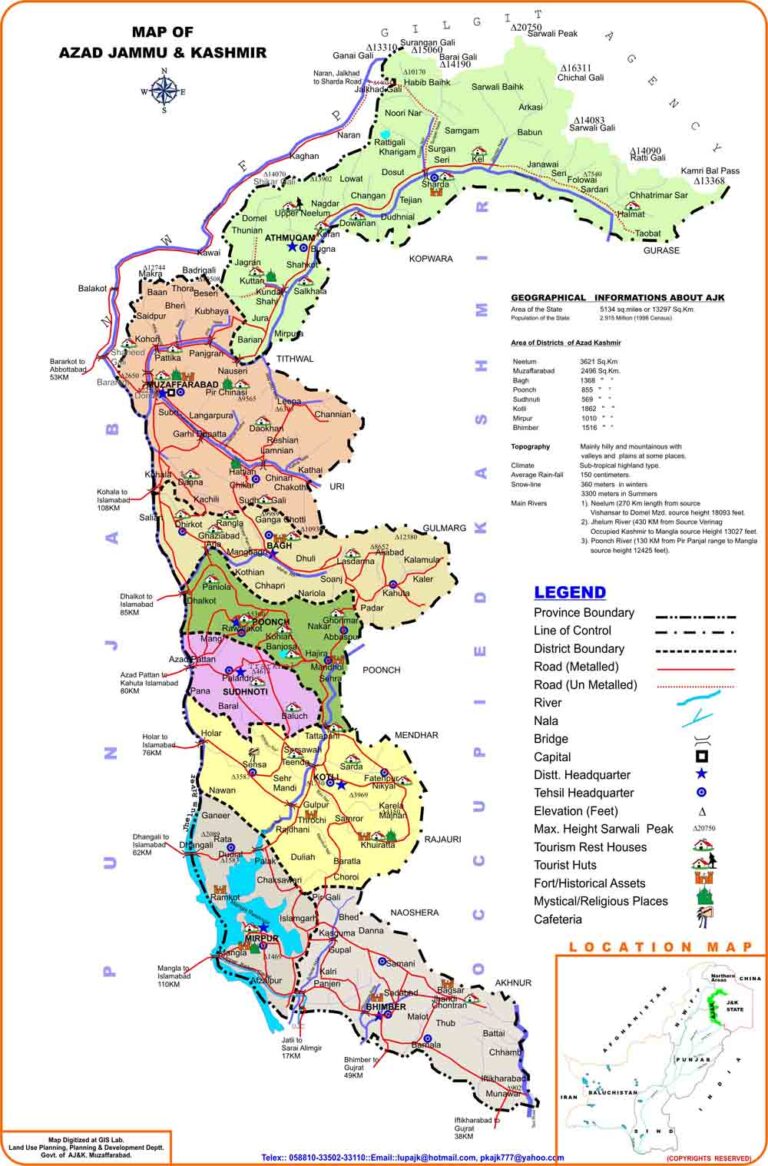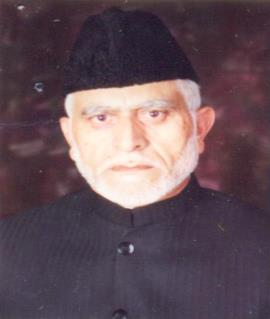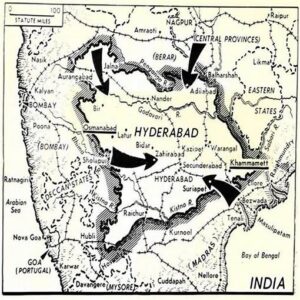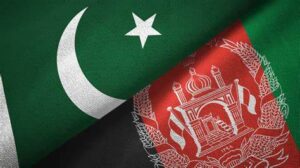By Justice (r) Syed Manzoor Hussain Gillani
Background
Azad Jammu & Kashmir (AJK) comprises fragmented parts of Jammu and Kashmir state measuring 4471, sq miles, divided in three Revenue divisions, Muzaffarabad, Mirpur and Rawalakot. Muzaffarabad was part of Kashmir province while Mirpur and Rawalakot Divisions were part of Jammu province.
It was liberated from the princely ruler of the state, Maharaja Hari Singh after India was divided in two dominions, India and Pakistan in August 1947. The rulers of the princely state were at liberty to accede to any of the two dominions keeping in view religious composition and geographical contiguity of their state. The ruler opted for accession to India against the partition plan, on 26th of October 1947.
A government of the state in exile was announced on 5th Oct 1947 at Rawalpindi and formally declared and constituted on 24th Oct 1947 at Pallandri as an independent Govt representing entire state when part of the territories of the state came under control of emergency Government.
On complaint to UN Security Council by India, the Council, with the consent of India and Pakistan, resolved on 5th January 1949, to settle the issue through plebiscite, which never took place.
The security council did not accept the AJK as an independent government of the state, instead, designated it as “Local Authority“ through its resolution dated 13th August 1948. But it was never constituted as such. (The constitution of Azad Jammu & Kashmir by justice (r) Syed Manzoor Hussain Gilani, Jumhori Publications Lahore, page 1110)
Special representative of the council Mr. Joseph Korbel explaining different terminologies used in the security council resolution dated 13th August 1948 stated on 31 august 1948, that “subject to surveillance of commission the local authorities will have full political and administrative control “. He stated on 2nd September 1948 that, “we have gone as far as we could to meet the point of view of Azad Kashmir people. We have tried to deal with the DeFacto situation. But we cannot lose sight of the fact that the state of Jammu and Kashmir still exists as a legal entity. We have to respect its sovereignty.” (Clarification of the United Nations Commission’s Resolution dated 13th August 1948 given by the Commission in writing and orally to the Pakistan Representatives).
Pursuant to it, a ceasefire agreement was brokered under the auspices of UN Commission for India and Pakistan establishing a cease fire line in the state on 29 July 1949, though actual cease fire took place on 1st of January 1949 under provisions of part I of resolution of 23 August 1948. (The constitution of Azad Jammu & Kashmir by justice (r) Syed Manzoor Hussain Gilani, page 1116. Jumhori publications Lahore).
This agreement practically divided and sealed the fate of state. Simla agreement of 1972 converted the “cease fire line” into “line of control.” It reaffirms the impression of “unwritten division.” (ibid, page 1158)
Legal Status in Making
Ceasefire line agreement was followed by a tripartite agreement between AJK government and its only political party All Jammu & Kashmir Muslim conference and Government of Pakistan on 28th April 1949 (ibid, p, 1066) at Karachi distributing powers between AJK and Government of Pakistan, thus brining the AJK under the effective control of government of Pakistan.
Formal legal document regulating powers of AJK government and government of Pakistan were formalised by Government of Pakistan through ministry of kashmir affairs under rules of business 1950 promulgated by the Supreme Head of AJK movement on 28 th of December 1950 which were amended in 1952 and 1958. ( ibid, P, 1176- 1201)
These rules also regulated the appointment of president of AJK and council of ministers. The president was elected by the general council of All Jammu & Kashmir Muslim conference duly recognized as such by government of Pakistan in the ministry of Kashmir affairs and to hold office during its pleasure. Usually, a joint secretary of the ministry was designated to accomplish the job. The joint secretary was replaced by the chief advisor under amended rules of business in 1958. He was repository of all powers, and his word was final in governmental business.
After enforcement of basic Democracies system in Pakistan, it was replicated in AJK as well in 1960. Presidential Election Act 1960 was enforced through which the president was elected by the members of the basic Democracies elected under AJK Basic Democracies Act 1960.
In 1964, Azad Jammu & Kashmir Government Act was enforced as Act No iv of 1964. (Ibid P, 1228) A state council consisting of eight members elected by basic democrats was constituted one of whom was nominated by Chief Advisor to be its chairman, unless chief advisor deemed proper to appoint any other person. The chairman was ex officio president of Azad Jammu & Kashmir to hold office during his pleasure. The council was competent to make laws subject to prior approval of chief Advisor. This Act was replaced by Government Act 1968 on 17th September 1968 followed amendment Act, 1969 (ibid, P-1233- 1243)
This Act was a modified form of Act 1964 with the difference that chief advisor was empowered to nominate four members for the state council from amongst the state subject refugees settled in Pakistan for a term of five years. The chief advisor was empowered to suspend or dissolve the state council and declare emergency.
Acts 1964 and 1968 were most humiliating and insulting thrusting a person of the rank of joint secretary, even below him in the ministry of Kashmir affairs as chief advisor over the head of elected members and stalwart leaders of AJK.
Due to outright resentment and condemnation of these Acts by all factions of civil and political society, The Azad Jammu & Kashmir Government Act 1970 was enforced on 5th September 1970. (Ibid-P- 1246). This was the best AJK ever had or could have. It was based on presidential form with an Assembly for a tenure of four years consisting of twenty-five members. Except defense, foreign affairs, communication, currency and responsibilities of government of Pakistan under UNCIP resolutions, all powers including tax collection vested in AJK government. Fundamental rights with the power to enforce them were vested in the High court. Board of judicial advisors was court of appeal under the Act. The contemptuous provision of overriding authority of joint secretary of ministry of Kashmir affairs or chief advisor was abolished.
Current Position
Under Unwritten political traditions, the system of the governance in AJK is invariably a replica of Pakistan. Like switch over to basic democracy system in 1960, the AJK presidential system was transformed into parliamentary system in 1974 through The Azad Jammu & Kashmir Interim constitution Act 1974, on the pattern of Pakistan Constitution 1973.
– [ ] Azad Jammu & Kashmir council under Art. 21, of the 1974 interim constitution Act was unique in its nature before 13th Amendment, consisting of three legislative bodies and two Governments.
– [ ] First, AJK council was created headed by prime minister of Pakistan as its chairman with five members of parliaments to be nominated by prime minister from amongst members of parliament of Pakistan and six members to be elected by AJK Assembly. President of AJK was its vice chairman, federal minister for Kashmir affairs is its ex- officio member. It was vested with all the legislative powers on the subjects mentioned in the council legislative list including executive authority under those laws. It was two in one I.e., legislative body like parliament and a proxy of federal Govt of Pakistan under AJK constitution.
– [ ] Second, Joint sitting, comprising AJK Assembly, AJK council and Minister in charge of council secretariat was vested with the authority like constituent Assembly for amendment of constitution and electoral college for election and removal of president. And,
– [ ] Thirdly, The residuary legislative powers, except defense, foreign affairs, communication, currency and UNCIP resolutions, vest in AJK legislative Assembly.
– [ ] The legislative Assembly under Art. 22, consists of forty-five members. Thirty-three members are elected from AJK territorial constituencies, 12 from state subjects’ refugees from occupied Jammu & Kashmir settled in Pakistan, (six from each unit).
– [ ] Five women and three others one each for Ulma e din & Mushaikh , a state subject living abroad Pakistan and one from technocrats and other professionals to be elected by elected members of the Assembly.
– [ ] Executive authority under the laws made by the Assembly vests in AJK government headed by prime minister of AJK and his cabinet.
– [ ] Constitution (13th amendment Act) 2018 made significant departures of far-reaching affect such as;
-A) Instead of “The AJK interim constitution Act“ it would be called as “AJK interim constitution.” The word “Act “was deleted. (As if Act didn’t have the authority like a constitution, although it was religiously followed since 1974, as Government of India Act 1935 was followed till India and Pakistan enforced their own constitutions).
B) More fundamental rights were added to the constitution, besides principles of policy at par with constitution of Pakistan 1973, as enforce.
C) The legislative powers of the council are vested in the “Government of Pakistan”, not in parliament, along with Executive authority there under.
It is akin to make AJK as a territory governed by the president of Pakistan under constitution of Pakistan.
The AJK Assembly is also empowered to legislate on subjects listed in part B of the council legislative list with the consent of Government of Pakistan under Art 31(4).
D) The most paradoxical position created under 13th amendment is divesting the council of all legislative and executive powers but keeping the members and employees intact for “. Consultative role in respect of matters and subjects mentioned in sub -Article (3) of Article 31 and in respect of responsibilities of government of Pakistan under UNCIP Resolutions “. It is practically redundant as no such consultative process has taken place since 2018 when 13th amendment came into force, but members and hundreds of employees of the council are enjoying the pay privileges and perks equal to their counterparts in the federal Government.
E) The financial powers of the council are transferred to AJK Assembly and Government as the case may be.
Power to amend the constitution is also transferred to AJK Assembly, instead of joint sitting, subject to two third majority, but no amendment can be made in articles 31, 33 and 56 without prior approval of the Government of Pakistan.
Power to elect and impeach the president is also vested in Assembly instead of joint sitting under Art. 5 & 6. However, two third majority of the total number of members of Assembly is required to remove the president.
Critical analysis
– [ ] Azad Jammu & Kashmir including (Gilgit Baltistan) are neither independent states nor part or provinces of Pakistan under constitution of Islamic Republic of Pakistan 1973 but are even then governed and regulated by government of Pakistan at macro as well as micro level from Islamabad directly and Muzaffarabad and Gilgit through federal bureaucracy, without representation in policy, decision, legislation and executive bodies of Pakistan. The cabinet division of Pakistan through two successive notifications of the cabinet division D.O. No 8/9/70 Cord -1 dated 11th May 1971 and No.6/7/88-GC Dated 6th June 1988 has directed that “Although AJK is not a part of Pakistan within the meaning of Art Art. 1(2) (d) of the Constitution, it should for all practical purposes be treated like any other province of the Federation”. It is treated like a province with all provincial obligations and duties, but without rights, privileges and status of a province. Same is true of Gilgit – Baltistan.
– [ ] All legislative and executive powers erstwhile vested in council are given to Government of Pakistan under Art. 31(3) and 19 of the constitution respectively, through 13th amendment of constitution, except finance and audit, which are vested in AJK Assembly along with their executive authority to Government of AJK.
– [ ] Surprisingly, the composition of council still remains as such including its employees and members, with all their pay, perks and privileges, without doing any job. This is travesty of constitution.
– [ ] It is stipulated under article 19 (4) that relationship between Pakistan and AJK shall be regulated in accordance with Govt of Pakistan cabinet division notification. No 8/9/70 dated 11 May 1971, that it shall continue being run like a province without any provincial rights and status.
– [ ] The least that can be said about it is that “it is New Neo colonialism with the connivance of local politicians for their petty tribal interests “.
– [ ] Twelve seats are reserved for state subjects in AJK Assembly in the name of (J & K) Refugees settled in Pakistan with the same perks and privileges as territorially elected members, besides minister’s slots and twenty-five pc quota in jobs and professional colleges. They also share federal quota of jobs reserved for AJK residents, besides having a right to share from the quota reserved for the province in which they are settled.
– [ ] This is again travesty of constitution as the authority of AJK assembly and government is restricted to territories of Azad Jammu& Kashmir under its control under Art. 2 of the constitution.
– [ ] Besides being unconstitutional, it is Un Democratic, unjust and arbitrary as well to give power of representation, law making, governing and sharing twenty-five pc of job and budget quota to those who neither reside in AJK, nor under its control and are not its payers, but just act as facilitators of establishment to keep AJK government under its thumb. AJK leaders are all privy to it to get themselves connected with leaders of political parties to which beneficiaries belong in the provinces where they reside and have an influence in the law making and administrative structure of federal government, be it civil or military. It is breeding resentment against Pakistan and establishment in AJK.
Being constitutionally segregated from mainland Pakistan, there is a sense of alienation and non-ownership in AJK people. Colonial attitude of Pakistani authorities against AJK equally breeds hatred.
AJK is constitutionally and politically nonentity as such, but under the overall control of government of Pakistan without being its territory or province which lurks in the security risk as India claims its recovery from Pakistan based on the accession by its ruler and incorporation in its constitution as its part. India justified forceful occupation of Nobra valley of Skardu division in 1971, Siachen in 1984 and evacuation of Pakistani forces from Kargil in 1999 on this false pretext.
Pakistan is oblivious of the fact that Governor general has subjected accession of state to plebiscite and UNSC has also not accepted accession. State’s future is hanging resolution under Indian independence Act of 1947 read with Government of India Act 1935 and UNCIP Resolutions.
AJK & G-B Synchronisation and Way Forward
Gilgit- Baltistan is also a part of disputed state of Jammu & Kashmir governed separately by Government of Pakistan through ministry of Kashmir and Northern Affairs Division, hence fate of AJK and GB is blended to gather.
Both the territories suffer identity crisis and have gone through different political and administrative trials by Government of Pakistan. Both require transformation from non-entity to a cognizable political entity.
A lot of work has been done by many NGO’s and Think Tanks for empowerment of AJK and GB which has energized a thought process in relevant circles. A comprehensive report has been published by Association for The Rights of People of Jammu & Kashmir in 2012 and 2014 followed by a meeting with Sartaj Aziz then Advisor on Foreign Affairs of Government of Pakistan. He appreciated the effort as “first serious report on the subject “. It is available on www.arjk.org.
Except internal governance in two territories of the state of Jammu & Kashmir, i.e., AJK & GB, under control of Pakistan, the political and constitutional status of both is similar and requires similar and simultaneous reforms to retrieve them from Neo-Colonialism to post-colonial status.
Notwithstanding Mantra of Kashmir dispute , both the territories are 45% of the total area of the state of Jammu & Kashmir with seven million population , but are kept hostage to Dispute of the state since seventy five years with democratic deficit in governance, rights and status equal to their counter parts in Pakistan which governs “these disputed territories“ like rest of Pakistan on the pretext that it will adversely affect Pakistani/Kashmiris stance over Kashmir issue and would amount to violation of UNCIP Resolutions on Kashmir.
India on the other hand kept part of state in its control symbolically disputed with a distinctive provision of Art 370 allowing it to be governed internally by its own constitution including all rights and status equal to rest of territories/states under the sovereign control of union of India till 5th august 2019 , when this provision was abrogated and extended whole of the Indian constitution to the state , besides breaking the state in two parts renaming as Union Territories of Jammu & Kashmir and “Union territory of Ladakh“.
But it doesn’t change its disputed character nationally and internationally as long as the UN RESOLUTIONS and RESOLVE of the people of the state remains intact.
Internal governance in any manner does not change the status of disputed territory till parties to the dispute agree to a dispensation, notwithstanding howsoever the occupying force drafts the words to govern it . Internal governance is internal self-determination pending resolution of dispute for final determination. It has nothing to do with that instead, it is in violation thereof to keep their democratic and civic rights in limbo as the “ local authority had to be constituted in both the territories with full political and administrative control “ under UNCIP Resolutions, but it has not been .
The nature of governance is a gradual process subject to change with the change of local or global concept of governance. Pakistan has itself changed the internal governance of these territories from time to time as it felt expedient to do so.
The independent status of AJK set up on 24th of Oct in 1947, was changed in 1949 through tripartite agreement between AJK Govt, Government of Pakistan and only local party then in field, All Jammu & Kashmir Muslim Conference under Karachi agreement.
It was then regulated under rules of business in 1950 amended in 1952 and 1958. Presidential system based on direct election through basic Democrats was introduced under 1960 Act. Amendments were made in it through Act 1964 and 1966. All these were drastically changed under Government Act 1970 to elect president on the basis of adult franchise. This system was replaced by parliamentary system through constitution Act 1974. It was suspended in 1977 and again revived in 1985 .13th Amendment of the constitution in 2018 gave it a new shape, as discussed above.
Similarly, there was no system at all in “Northern Area“ till it was transferred to NWFP Governor and administered by political Resident from Peshawar in 1948 and governed under FCR.
– IT’s administration was transferred to Ministry of Kashmir affairs in 1950.
– Baltistan was separated from Gilgit as a separate agency in 1964;
– Resident commissioner was appointed for Norther Area in 1967.
– Constitutional order was enforced Advisory council was appointed through direct elections in 1970.
– Agencies were converted into Districts and a new district Diamer was created in 1972.
– In 1974, Jagirdari system was abolished:
– FCR was repealed in 1974.
– Two new Districts of Ghanche and Ghizer were created, and Northern Area Advisory council was elected.
– In 1975, Legal framework order was introduced with broader reforms by abrogating Constitutional order 1970.
– In 1994, Governance order was enforced with expanded reforms.
– Gilgit- Baltistan (Empowerment and Self Governance) order 2009 was introduced with further empowerment which was overtaken by Gilgit-Baltistan Order, 2018.
– (presentation on New Northern Areas Governance order 2009 Dated 29-8- 2009)
With this history of constitutional development, empowering along with tightening the grip of federal government, the system remained rolling up and down. It never affected the Kashmir issue, nor did it violate UNCIP Resolutions. But when it comes to empowering at federal level, it irritates the beneficiaries of this loose system at local as well as federal level. They never want opening of the common people at federal level to be part of policy and decision-making apprehending to jeopardize their imbedded and in accounted for interests. They lose sight of the fact that state of Pakistan is loser in losing the confidence of people in Pakistan, to keep them slaves.
In view of changing global scenario, particularly the hegemonic expansionist designs of India under the leadership of Narendra Modi, scrapping the Jammu & Kashmir constitution, extending whole of Indian constitution to state by abrogating Art 370+35A and reasserting its claim over recovering AJK and GB, rising Chinese influence in the areas, diplomatic alienation of Pakistan, poor governance in these areas and lot more reasons, it is strategically, economically and politically imperative to empower AJK & GB jointly or severely, at the pattern like provinces of Pakistan under constitution of Pakistan with all powers, authority and rights like other provinces of Pakistan by keeping intact the disputed character of the territories pending final resolution of the disputed state as a whole.
Sartaj Aziz committee report “Dated 10 March 2017 on constitutional and Administrative reforms in Gilgit- Baltistan “, though for GB only, is a ray of hope for both the areas equally to begin with, till the Dispute over Kashmir is resolved.
I will conclude with paras 62 to 64, from the report as;
“Although Committee’s TOR’s are confined to Gilgit-Baltistan, it must be pointed out that there is a need for constitutional and Administrative Reforms in AJK. In addition, the recommendations of this Committee, to give representation to GB in the two Houses of Parliament, if implemented, would create further differentiation in the relative status of AJK and GB. It is therefore highly important to harmonize the reforms track of GB With that of AJK.’
‘ 63- In this context it is encouraging to note that the Prime Minister during his visit to Muzaffarabad on 29 December 2016 approved the establishment of a five-member Committee under Minister for Law & Justice to “review the empowerment of AJK Government on the analogy of provinces after the enactment of the 18th Amendment.”
‘64- It would therefore be prudent that the timing of implementing the recommendations to give Gilgit- Baltistan representation in the parliament of Pakistan is synchronized with constitutional reforms in AJK. The remaining reforms recommend in paragraphs 60 (e) , (f) and (g) and 64 to 78 can be implemented straightway.








